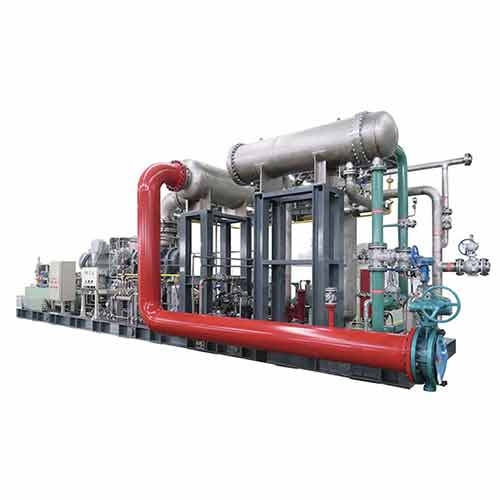The Powerhouse Behind LPG: The LPG Compressor
What is meant by lpg compressor?
An Lpg compressor is an essential element in the processing and distribution of this extensively utilized fuel source. By pressurizing the gas from its liquid form to a vapour that can be readily transported or used, this mechanical device serves a crucial role in ensuring the integrity and efficiency of LPG systems. This compressor, which comprises several essential parts such as a motor, cylinders, valves, and pipelines, operates on either the positive displacement or dynamic compression principle, depending on the design.
The positive displacement type produces a constant flow and pressure output because LPG is trapped in a chamber and compressed when the chamber’s volume decreases. On the other hand, dynamic compressors utilize revolving impellers or blades to accelerate the gas and then decelerate it through diffusers, raising its pressure. They are widely used in many fields, including automotive, residential, and industrial. They are necessary for fuelling LPG-powered cars, refuelling propane tanks and providing gas for cooking and heating equipment. For LPG consumption to remain safe and convenient and to ensure that this adaptable fuel source is available for various applications, reliable and efficient compressors are crucial.
What variables affect the effectiveness of a lpg compressor system?
A liquefied petroleum gas compressor system’s performance is essential for diverse industrial, residential, and commercial applications to operate dependably and affordably. Understanding the elements that affect the efficiency of this compressor systems is crucial for maximizing performance and reducing operational expenses.

- Compression Ratio:
One of the most important variables influencing compressor effectiveness is the compression ratio, which is the ratio of the discharge pressure to the suction pressure. Increased labour input is required for higher compression ratios, which reduces efficiency. The needed compression ratio for the particular application should be considered while choosing a compressor.
- Compressor Type:
Different compressors, including centrifugal, rotary screws, and reciprocating ones, have varied efficiency. Centrifugal compressors perform best at greater compression ratios, whereas reciprocating compressors are often more effective at lower ratios. The requirements of the application should guide the compressor type selection.
- The efficiency of the Compressor’s Motor:
The effectiveness of the motor powering the compressor significantly affects the effectiveness of the entire system. High-efficiency motors use less energy, which saves money and has a less negative impact on the environment.
- Cooling and Lubrication:
Proper cooling and maintenance of the compressor’s parts are essential for preserving performance and prolonging the compressor’s life. Increased friction and heat from inadequate cooling or lubrication can lower efficiency.
- Compressor Speed:
Variable speed controls are frequently found on compressors, allowing them to adapt to shifting needs. When opposed to running at a continuous high speed, running the compressor at reduced rates during times of lesser demand can greatly increase efficiency.
- Inlet Conditions:
The temperature and pressure of the gas entering the compressor impact its effectiveness at the inlet. Lower temperature gas compression can improve effectiveness. To maximize compressor performance, input conditions must be closely monitored and managed.
- Maintenance and Wear:
Compressor parts like valves and seals must be regularly maintained and observed to maintain efficiency. Leaks and poor performance might result from wear and tear.
Which benefits lpg compressor offer?
Lpg compressor is essential equipment in various sectors and applications because they provide many advantages, from cost savings to environmental benefits. We’ll discuss the many benefits of LPG compressors in this blog article, including how they improve efficiency, safety, and sustainability.
- The conversion of liquid LPG into vapour is done as efficiently as possible thanks to the efficiency of these compressors. LPG is a cost-effective fuel source for various applications because of its high energy efficiency and lower operating costs.
- The possibility of cost reduction is one of the most important benefits of these compressors. Businesses can save money by compressing LPG locally instead of paying to transport and store large LPG cylinders or tanks. LPG is also frequently less expensive than electricity or other fossil fuels, making it a financially appealing option.
- LPG is renowned for its ability to burn cleanly. Compared to traditional fossil fuels, they emit fewer hazardous pollutants, including sulphur dioxide, nitrogen oxides, and particulates, when utilized as a fuel source. As a result, LPG is a greener choice for industrial, domestic, and heating activities.
- Compressors can be used for a variety of purposes. They are often used in industrial operations, such as those in the glass, ceramics, and metalworking sectors and in household heating, cooking, and hot water systems. LPG compressors are flexible enough to meet a variety of demands.
- Compressors for LPG deliver vaporized LPG as needed. Large LPG tanks would no longer need storage, which would be hazardous and inconvenient. The danger of overstocking or running out of supply is decreased since users may acquire the necessary amount of LPG when needed.
- A company’s carbon footprint may greatly decrease by using LPG as its fuel source. Because of its cleaner burning, fewer greenhouse gas emissions are produced, promoting environmental sustainability and supporting emissions reduction objectives.
- When used properly, LPG is naturally safe, and lpg compressor systems are built with security elements to ensure safe operation. These systems reduce the possibility of accidents by including pressure relief valves, emergency shutdown mechanisms, and automated leak detection.
Conclusion:
Industry operations have been revolutionized by lpg compressor, greatly increasing efficiency and safety. These potent machines have become indispensable in several industries, including oil and gas, manufacturing, and even agriculture. The capacity of these compressors to effectively compress and store liquefied petroleum gas (LPG) is one of its main benefits. We at HUAYAN are working hard to establish ourselves as a leader in this market because we are thoroughly aware of the demands placed on the compressor business. A strong basis for creating high-quality compressors is provided by our company’s competent technical design, performance calculation, and other production and processing skills, as well as its many pieces of leading processing machinery.
